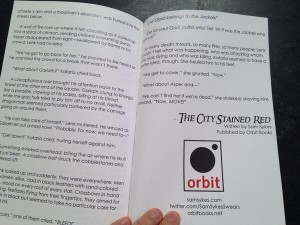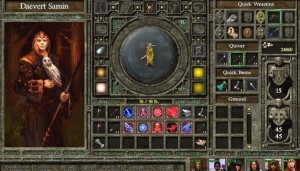Colonels of Industry
I am not of the opinion that Traditionally Published Authors and Self-Published Authors are as chainmail and rust monsters (see what happened there? That’s nerd cred, son).
Rather, I’m of the opinion that the line between the two is getting fuzzier every day. Good kind of fuzzy, like a teddy bear someone would hand you after you watched your house burn down. Short fiction is becoming an increasingly effective way to gateway new readers into a series, as Brian McClellan has noted, and one of the most profitable ways to market that short fiction is to put it out there on your own steam. I predict that more and more authors of epic fantasy, a genre possessed of fans who cannot get enough worldbuilding, will be following this kind of model where auxiliary fiction will be produced of their own accord and put out there.
This is a good thing, in my perspective. But with it comes a few challenges.
See, when you go with a publisher, you are not actually just getting someone to print your book. You’re getting someone to edit it, format it, make it look nice, do cover art and, most importantly, market it. When you strike out on your own, you’re doing all that by yourself.
I can’t tell you how to do most of that stuff, since my plan for getting cover art would be basically to beg Todd Lockwood and then maybe sacrifice a goat in his name in hopes of appeasing him. But I like to think I know a little something about marketing and promoting yourself.
Viewers of this blog will remember that I’ve talked about this subject before. The best way to market is to Be Honest, Be Unashamed, Be Enthusiastic, Be Involved and also Don’t Be Bitter, Don’t Be Dishonest, Don’t Be Spammy and Don’t Be Discouraged. These are good foundations upon which to build further ideas of promotion.
So with that in mind, I’d like to talk about the idea of space.
It’s not typically something we think about on the internet, as this is more or less one massive conversation in which several billion people are involved in, all talking at once. The idea of space in a conversation occurs to us pretty naturally in the real world where, if we were to see two people sitting by their own talking about the merits of Coke vs. Pepsi, you probably wouldn’t think to walk over there, sit down and offer your opinion. On twitter, though, when two people are having that same conversation, people for some reason think nothing of butting in and saying “COKE IS POISON DON’T PUT THAT SHIT IN YOUR BODY YOU STUPID SKANK.”
To a degree, this is inevitable. The internet, after all, is a terrible place. And one of the main advantages of social media sites from a promotional perspective is that the access to the author is opened up. People actually enjoy talking to the authors of their favorite works. But again, let us consider the aspect of space.
You might love Joe Hill. You might really like it if Joe Hill were at a convention that you could go to and go up to him and say: “Mr. Hill, I love your work.” And you might really like it if Joe Hill replied: “Well, thank you, I’ll have a new book out next month and I will be happy to sign it for you.” You might really like that whole thing.
If you were to wake up one morning, go to the bathroom, raise the toilet lid and find Joe Hill popping out of the bowl saying: “Hey, dude, I have a new book out only $19.99, act now and I’ll throw in a free shamwow.” Well, you might not like that.
I bring this up only because I see this happening more often on twitter lately.
Out of nowhere, an author (usually self-published) will send me a tweet that has nothing to do with anything I have been talking about and slap me with a link to their book and a generic “buy it now” message.
Guys. Don’t do this.
This is the equivalent of someone butting in on your conversation. This is the equivalent of finding a Chinese takeout menu slid under your door. This is the equivalent of waking up to find Joe Hill in your toilet. None of those are pleasant things.
This falls under Don’t Be Spammy, but what I’ve never talked about before is that the concept of space goes both ways (hurr).
This isn’t the only talk about self-promotion gone awry you’ll see. Talk to any author, any reader, they’ll tell you times they’ve been put off or alienated by an overly-aggressive author. Hell, you can read any community website out there and probably hear something about how groan-inducing self-promotion is, how tacky, indulgent and terrible it is.
You could be forgiven for being for being paralyzed with fear from ever self-promoting again out of a blind terror of being judged. But what all these horror stories fail to tell you is that, in addition to being tacky, indulgent and terrible, self-promotion is also extremely, extremely necessary.
I love being a traditionally published author, but I’m also not Jonathan Franzen, so I don’t have the kind of massive marketing budget behind me that I can just toss my book out there and trust some combination of my publisher, Oprah and Jesus to make it a smash hit. I have to self-promote. I have to make people aware of my books. I have to make my books sound like they’re worth buying.
And that’s where the concept of YOUR space, as an author, comes in.
A lot of social media is actually having conversations with all those several billion people. It’s putting what you want to say out there and seeing who responds. It’s hawking, advertising, handselling, promising, reassuring, apologizing and sometimes bribing with sloppy kisses. Sometimes it feels like you’re talking to nobody in particular. Sometimes it feels like no one is listening. But it’s out there (and it’s out there forever), so you gotta make use of it.
Your twitter profile, your facebook page, your blog post, your website is where you go to make yourself known. This is where you have links to buy shit, excerpts for people to read, pornography to peruse, whatever sells. And you should definitely feel free to do that. Say what you want, as loud as you want. Scream it out into the ether.
Some people might complain about the self-promotion, but fuck them, that’s your space.
And this is where spaces collide. If your promotion is entertaining, clever or funny, people will eventually come to you. And when they do, if your space is adequately set up to let them see what you’ve got, they will probably partake of your delicious verbiage.
I should stress, though, that this is where the part about Being Honest and Being Enthusiastic comes into play. The relationship of an author to their readers is peculiar; people prefer to think of you as a person or at least a very good story. If your space is 100% advertisements, people will think you’re more a spambot broken free. Remember to talk about stuff you like, stuff you’re doing, stuff you’re worried about, any stuff that isn’t just about selling your book or complaining about people not buying your book.
Readers coming to your space is great. That’s how you get noticed. You coming to readers’ space is different. That can easily be alienating and weird.
Like, imagine if you were sitting in a living room with your friends, who were all Joe Hill fans, and talking about his latest book and your opinions on it. Now, imagine that the toilet you had installed in your living room for some reason suddenly opens and between the lid and seat, Joe Hill’s glassy stare peers out from the darkness beneath, watching you eagerly for your opinion.
Pretty fucking weird, right? That’s what going into a reader’s space is like.
But not all the time.
I’m a big fan of /r/fantasy for a lot of reasons, but one of them is that the authors and readers share a common space there. It’s a very open, welcoming place for both people. The rules are a bit more fluid there and it’s easier to talk to people. But again, the rules of all self-promotion apply: Do Honesty, Enthusiasm and Unashamedness. Don’t Spam, Bitter or Dishonest.
The internet is still kind of a fucked up place as far as socializing goes. We’re still figuring out a lot of this. But I think you’ll be much happier if you take these guidelines.
Mostly because your book will probably sell.
Which means you won’t die in poverty.
Hooray!
Colonels of Industry Read More »













